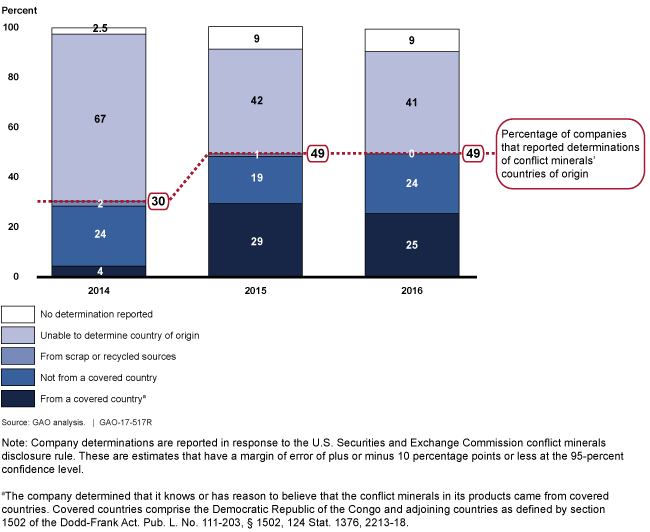SEC Conflict Minerals Rule: 2017 Review of Company Disclosures in Response to the U.S. Securities and Exchange Commission Rule
Fast Facts
The exploitation of the mining and trade of "conflict minerals"—particularly tin, tungsten, tantalum, and gold from the Democratic Republic of the Congo—has contributed to severe human rights abuses. In 2012, the Securities and Exchange Commission adopted a disclosure and reporting rule under which certain companies whose products may contain these four minerals (from the DRC and its neighboring countries) must report on the source of these minerals.
We found in 2016 that nearly all the companies (96%) that were required to report this source information did so—although they provided varying amounts of data.
Companies Reporting on Sources of 4 Conflict Minerals, 2014-2016

A bar graph showing how companies have reported on the sources of 4 conflict minerals.
Highlights
What GAO Found
Our review of companies’ conflict minerals disclosures filed with the Securities and Exchange Commission in 2016 found that, in general, they were similar to disclosures filed in prior years. In 2016, a similar number of companies filed conflict minerals disclosures as in 2015 and 2014. Our review of a generalizable sample of 2016 filings found that almost all companies that filed conflict minerals disclosures reported performing inquiries about their conflict minerals’ country of origin, similar to 2014 and 2015. Almost all companies also reported conducting due diligence on the source and chain of custody of their conflict minerals and used the Organization for Economic Cooperation and Development’s (OECD) internationally recognized framework for their due diligence in 2016. After conducting due diligence, an estimated 39 percent of the companies reported in 2016 that they were able to determine that their conflict minerals came from covered countries or from scrap or recycled sources, compared with 23 percent in 2015. Almost all of the companies that reported conducting due diligence in 2016 reported that they could not determine whether the conflict minerals financed or benefited armed groups, as in 2015 and 2014.
Why GAO Did This Study
The Dodd-Frank Act included a provision for GAO to report, beginning in 2012 and annually thereafter, on the effectiveness of the SEC rule in promoting peace and security in the DRC and adjoining countries, among other things.
For more information, contact Kimberly Gianopoulos at (202) 512-8612 or GianopoulosK@gao.gov.
